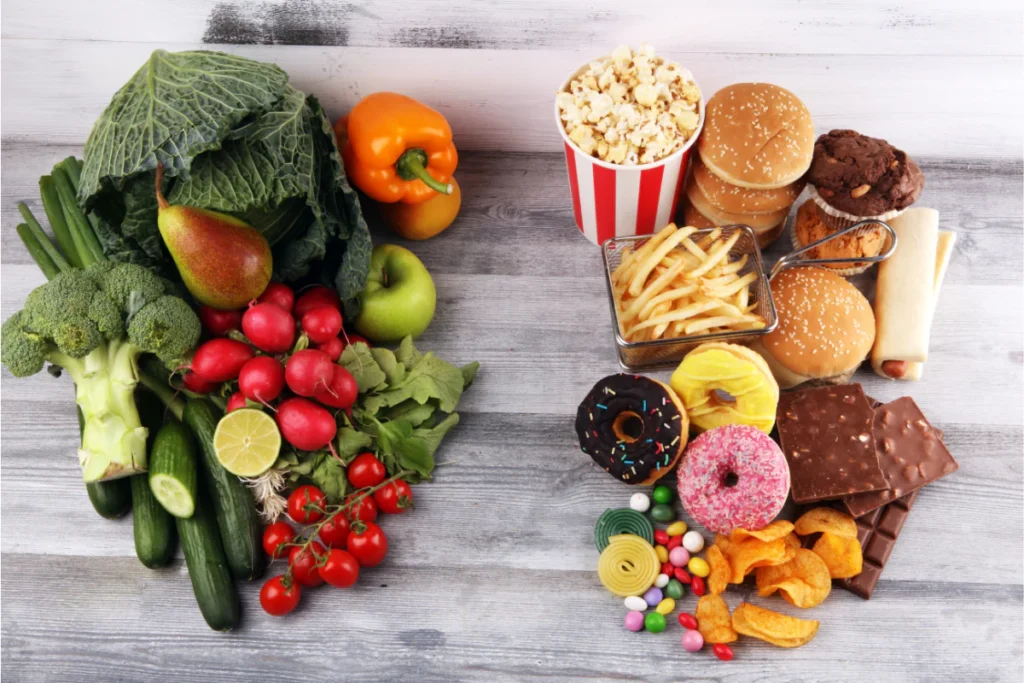Health is wealth (Small Changes, Big Impact)

Takeout versus homemade. The answer to the question of which is best for a healthy body is probably obvious to all of us. Both have advantages and disadvantages and influence the body in various ways. (What’s Better: A Homemade Feast or a Takeout Treat?)
Eating is required. What we eat and where it takes us are the important questions.
Which is it, the right or incorrect way?
It’s been said that “eat to live, not live to eat.” which is accurate in a lot of ways. Indeed. All eating is healthy, unless it turns into excess.
Everybody has a hectic life. Rushness seems to be getting worse every day. People occasionally neglect to have breakfast. It is also the main reason why people gain weight. Breakfast should never be skipped.
A person consumes meals throughout the day for a reason, as you are aware. which I’ll talk about in my upcoming post.
The question now is which is better for the individual. Takeout or homemade?
The first factor is the body’s metabolism, which determines how intensely we move throughout the day.
It all comes down to how quickly the body is functioning right now.
Body types also have a major impact on metabolism. A rapid and steady body is unaffected by external food, whereas a slow body is greatly impacted. Whether they are exercising or not depends on it.
What’s Better: A Homemade Feast or a Takeout Treat?
Since nutritional value has a direct impact on health, energy levels, and long-term wellness, it is a crucial consideration when deciding between eating food prepared at home and eating it out.
Here’s how this decision is influenced by nutritional value:
Control Over Ingredients
Prepared Food: You may restrict bad fats, stay away from too much sugar and salt, and use fresh, high-quality products at home.
With the proper nutrients in the right amounts, this control guarantees that meals are well-balanced and customized to meet each person’s dietary requirements.
Outside Food: To improve flavor and shelf life, restaurants frequently employ processed foods along with additional fats, sugars, and sodium.
It might be challenging to maintain a balanced diet while using these additions because they can raise caloric intake without contributing necessary nutrients.
Control of Calories and Portion Size
Homemade Food: Cooking at home gives you more control over portion sizes, which lowers your chance of overindulging and promotes thoughtful meal planning.
Maintaining this equilibrium is crucial for controlling weight and caloric intake.
Food from Outside: Meals from outside are sometimes served in larger servings and come with sides, dressings, and sauces that are heavy in calories.
When taken frequently, these extras can result in calorie excess and nutritional imbalance.
What’s Better: A Homemade Feast or a Takeout Treat?
Freshness and micronutrients
Homemade Food: You may incorporate nutrient-dense meals that provide vital vitamins and minerals, such fresh veggies, whole grains, and lean proteins, when you cook at home.
Homemade meals that are freshly prepared retain more vitamins and antioxidants, which promotes general health.
Food from Outside: Processed meals and fast food frequently lack fiber, vitamins, and minerals.
Vegetables may be less fresh or overdone, which results in nutrient loss even in healthier selections.
Why should we prefer homemade food instead of market food?
Benefits to health: Since home cooking uses fresh products and few or no preservatives, it is typically healthier than eating out. In order to meet the need for quick service, many restaurants use processed foods, which frequently results in unhealthy eating.
You have total control over the components in homemade meals, so you may use healthful grains, lean meats, and fresh vegetables. Limiting bad fats, sugar, and sodium—all of which are frequently present in foods made in stores—is possible.
Balanced Nutrition: Making meals at home allows you to easily design meals that are suited to your dietary requirements and guarantee that you are getting the proper amounts of macronutrients, vitamins, and minerals.
Due to the elimination of expenses like tips, delivery fees, and excessive food markups, cooking at home is typically less expensive than dining out or getting takeout.
Decreased Food Waste: Cooking at home allows you to better control portion sizes and utilize leftover foods, which lowers grocery costs and food waste.
Control Over Cleanliness: By cooking at home, you can lower the risk of contamination or foodborne disease by ensuring fresh ingredients, clean kitchenware, and safe food handling procedures.

Kapiva Ashwagandha Gold Capsules, 183rd day harvested Potent Nagori Ashwagandha With Gold, Shilajit | Helps in Stress Management, Improve Energy and Stamina | For Men & Women (60 Capsules)
-21% ₹474
M.R.P.: ₹599
What’s Better: A Homemade Feast or a Takeout Treat?
Avoiding Needless Additives: To extend shelf life and improve flavor, market food frequently includes artificial coloring, preservatives, and flavor enhancers, which aren’t necessarily good for your health.
Preventing Overeating: By allowing you to regulate portion sizes, homemade meals help you avoid overindulging.
Larger servings are typically served at restaurants, which might result in an excessive intake of calories.
Cooking at home makes you more conscious of ingredients, preparation techniques, and portion amounts, which promotes mindful eating.
Dietary Flexibility: Whether you have dietary restrictions (such as low-carb, gluten-free, or vegetarian) or food allergies, cooking at home gives you the freedom to satisfy your tastes and health objectives without sacrificing quality.
Nutrient Density: By preparing meals at home, you can avoid consuming too many calories, sugar, or bad fats while still achieving your fitness and wellness objectives.
Cooking as a Stress-Relieving hobby: For many people, cooking is a therapeutic, peaceful hobby that encourages awareness. It could be a means of relaxing and taking pleasure in the creative process.
Social Connection and Family Bonding: Preparing and enjoying home-cooked meals with loved ones can improve relationships and foster wholesome food-related memories.
Decreased Packaging Waste: Compared to takeout, homemade meals typically require fewer single-use packaging, which helps to cut down on waste and lessen the impact on the environment.
Support for Local Ingredients: Choosing seasonal, local ingredients when cooking at home lowers the carbon footprint associated with food transportation.
What’s Better: A Homemade Feast or a Takeout Treat?
Homemade food has more advantages for the environment and mind, as well as higher nutritional quality, safety, and cost savings.
In addition to promoting health and fitness, cooking at home fosters sustainable habits and a mindful eating style.
Is home cooked food more hygienic?

Indeed, there are a number of reasons why food prepared at home is typically more hygienic than meals from outside.
You may make sure that all of the kitchenware, counters, and surfaces are thoroughly cleaned when cooking at home.
This measure lowers the chance of foodborne infections and helps avoid cross-contamination.
You can make sure that the ingredients are clean and fresh, and you may steer clear of using food that has been incorrectly stored or is about to expire.
You may practice safe food handling at home by washing your hands, separating raw and cooked foods, and keeping ingredients at the right temperature.
Time restraints and large order volumes in commercial kitchens can result in hygienic breaches such insufficient handwashing, inappropriate storage, and reusing dirty surfaces.
What’s Better: A Homemade Feast or a Takeout Treat?
Unnecessary preservatives and additives, which are frequently added to manufactured or restaurant foods to improve flavor and extend shelf life, are usually absent from home-cooked meals.
These additives are not always good for the body and can occasionally cause health problems.
When you cook at home, you can utilize high-quality, fresh products instead of premade or processed ones that may have been handled a lot.
There are fewer chances of contamination and nutrient deterioration when using fresh products.
Because so many different dishes are made in one area in a commercial kitchen, there is a greater chance of cross-contamination (e.g., allergens, bacteria from raw meat, etc.).
You have more control over how ingredients are handled and prepared in a safe and orderly way at home.
You may prevent bacterial growth at home by keeping an eye on the cooking and storage temperatures of various meals and making sure they are cooked through.
Errors with temperature regulation in restaurant kitchens may result in foodborne diseases. Despite adhering to hygienic rules, employees’ personal hygiene habits may differ.
It is difficult to maintain a constant degree of personal cleanliness in a busy kitchen, but cooking at home insures it.
In conclusion, because you have control over the quality of the ingredients, sanitation, safe handling, and cooking techniques, food prepared at home is usually more hygienic.
This lowers the possibility of contamination and ensures improved food safety, making home-cooked meals a safer and frequently healthier option.
Homemade food is Healthier?

Cooking at home gives you the opportunity to select premium, fresh ingredients. Preservatives, artificial flavors, harmful additives, and inferior oils that are frequently present in processed or restaurant meals can be avoided.
What’s Better: A Homemade Feast or a Takeout Treat?
Nutritional Balance: To make sure meals are well-balanced and full of vital nutrients, you can incorporate nutrient-dense foods like whole grains, lean proteins, and a range of veggies.
Reduced Saturated and Trans Fats: A lot of fast-food and restaurant foods have greater amounts of saturated and trans fats, which might be bad for your heart. Nuts, avocado, and olive oil are examples of healthier fats that you can use at home.
Decreased Sugar and Salt: You have more control over the amount of sugar and salt when you cook at home. Excessive levels are frequently found in packaged and restaurant foods, which can cause diabetes and high blood pressure.
Prevent Overeating: Takeout and restaurant portions are sometimes higher than the suggested serving sizes, which can result in overindulgence. Making meals at home enables you to provide sensible serving sizes, which aids with weight control.
Eating at home frequently entails slower, more deliberate eating, which promotes better digestion and lowers the risk of overindulging.
More Fiber: Whole foods high in fiber, such as fruits, vegetables, and whole grains, are frequently found in greater quantities in home-cooked meals. Fiber helps regulate blood sugar and cholesterol levels, aids in digestion, and avoids constipation.
Reduced Processed additives: Artificial additives and low-fiber refined grains are found in many processed foods and restaurant items, which can be more difficult to digest and less healthy for you overall.
Personalization for Health Objectives: You can modify meals to satisfy particular dietary needs, such as low-carb, low-sodium, gluten-free, or dairy-free, when you cook at home. It can be difficult to find this flexibility in dining establishments.
Control Over Allergens: Home-cooked meals give people with food allergies or sensitivities more control over ingredient selection and cross-contamination.
What’s Better: A Homemade Feast or a Takeout Treat?
Prevention of Chronic Diseases: Eating wholesome, home-cooked meals on a regular basis can lower your chance of developing chronic illnesses like diabetes, heart disease, obesity, and some types of cancer.
Food prepared at home typically has fewer calories, carbohydrates, and bad fats, which improves general health.
Better Mental Health: Eating meals prepared at home has a positive effect on mental health in addition to physical health. Cooking may be therapeutic, and eating healthful food gives you steady energy that improves your mood and mental clarity.
Enhances Cooking Knowledge and Skills: Cooking at home promotes a deeper comprehension of cooking methods and nutrition. Over time, this information encourages healthier decisions.
Good Family Habits: Cooking at home encourages a balanced lifestyle for all family members by fostering healthy eating habits and providing opportunities for meaningful family interaction around meals.
Because homemade food is fresher, more nutrient-dense, and lower in sodium, sugar, and bad fats, it is generally healthier.
It is the cornerstone of a healthy lifestyle since it gives you more control, supports certain health goals, and helps prevent chronic disease.